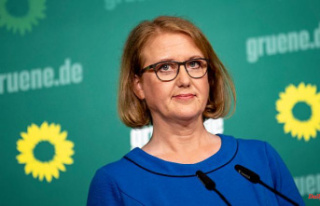She rejects injustice and demands "freedom for the prisoners of the patriarchy," writes Salma al-Shihab on Twitter. A court in Saudi Arabia sees this as a threat to state security and sentences the woman to 34 years in prison. It is the harshest punishment against activists in the country to date.
A woman in Saudi Arabia has been sentenced to 34 years in prison for having a Twitter account, following activists and sharing their posts. Through her activities on the online service, Salma al-Shihab "destabilized social and state security," the human rights organization GCHR quoted from the prosecutor's allegations. It is the harshest sentence that has ever been imposed on an activist in the country.
The mother of two and doctoral student al-Schihab actually lives in Great Britain. During a home visit to Saudi Arabia in January 2021, she was arrested a few days before her planned return trip. She belongs to the Shiite minority, which is discriminated against and persecuted in the Sunni country. She was initially sentenced to six years in prison before the sentence was increased to 34 years on appeal. After this prison sentence, there is also a travel ban of another 34 years.
Al-Schihab has around 2,500 followers on her Twitter profile. Among other things, she supported campaigns to end the system of male guardianship in Saudi Arabia, as well as the women's rights activist Lujain al-Hathul. "I reject injustice and support the oppressed," she wrote in a 2019 tweet. In late 2020, she called for "freedom for the prisoners of the patriarchy." The judges also justified the harsh sentence in the appeal judgment with the fight against terrorism.
The Berlin and London-based human rights organization ESOHR spoke of an "unprecedented and dangerous" verdict and a possible step towards further escalation against activists in the country. They have been arbitrarily sentenced in recent years and in some cases severely tortured. GCHR described the verdict as a "message of threats and intimidation from Crown Prince Mohammed bin Salman," the kingdom's de facto ruler, to "all internet activists." This is the "fate of all those who use social networks".
Chancellor Olaf Scholz called Crown Prince Mohammed on Tuesday, according to his spokesman. Among other things, it was about "economic policy issues" and "global effects" of the Russian war of aggression in Ukraine. A spokesman for the federal government left open whether it was also about human rights or the murder of journalist Jamal Khashoggi. The Crown Prince has been partially isolated internationally since Khashoggi's murder in October 2018. The US secret services see the crown prince as directly responsible. He denied ordering the crime.
Saudi Arabia has also been criticized for its military operations in neighboring Yemen. The war has brought a humanitarian catastrophe to the already impoverished country. Gradually, however, the de facto ruler of the kingdom seems to be becoming socially acceptable again in the West. In July he received US President Joe Biden in Saudi Arabia. In the same month he visited French President Emmanuel Macron in Paris and Greek Prime Minister Kyriakos Mitsotakis in Athens.












